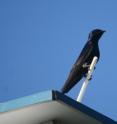For the birds or for me? Why do conservationists really help wildlife?
Volunteers who take part in conservation efforts may do it more for themselves than the wildlife they are trying to protect, a University of Alberta case study shows. A study of purple martin landlords—those who keep and monitor special birdhouses on their land—revealed that they were more motivated to take part in the conservation project for egoistic rather than altruistic reasons.
"Though there were areas of overlap, we found that common motivations for self-benefit included interaction with the birds, a sense of achievement, social interaction, personal stimulation and enjoyment," said Glen Hvenegaard, a co-author on the qualitative study and a professor of geography and environmental studies at the University of Alberta's Augustana campus in Canada.
The study, which compared self-motivated volunteers with recruited ones, was launched to find out what compelled people to donate their time. Understanding why they take part in conservation projects is important, says Hvenegaard. "Past research shows that people take part in wildlife activities for many reasons and so require a sophisticated level of management. Our findings reinforce that.
"Though self-satisfaction motivations were mentioned most often, people also had many unselfish reasons for taking part in conservation, including helping this vulnerable species, preserving nature for future generations and serving the community," Hvenegaard noted.
The results may help organizers of other conservation movements recruit and, more importantly, keep satisfied volunteers. "With declining budgets, most wildlife agencies are not well-equipped to manage the growing number of species at risk, so they are depending more on volunteers to help with wildlife management operations," Hvenegaard said.
This applies especially to purple martins, a member of the swallow family that is almost completely dependent on nest boxes and subsequent management provided by volunteers.
The study, which will be presented this fall at the Conference on Integrating Human Dimensions into Fisheries and Wildlife Management in Colorado, recommends that project organizers offer opportunities for social interaction through meetings, mentoring and phone lists, encourage landlords to record nesting results for their birds, and provide a broader understanding about the conservation of purple martins.
Source: University of Alberta
Other sources
- For The Birds Or For Me? Why Do Conservationists Really Help Wildlife?from Science DailyTue, 12 Aug 2008, 14:21:16 UTC
- Study: Ego may spur some conservationistsfrom UPIFri, 8 Aug 2008, 16:35:23 UTC
- For the birds or for me? Why do conservationists really help wildlife?from PhysorgThu, 7 Aug 2008, 18:07:13 UTC
